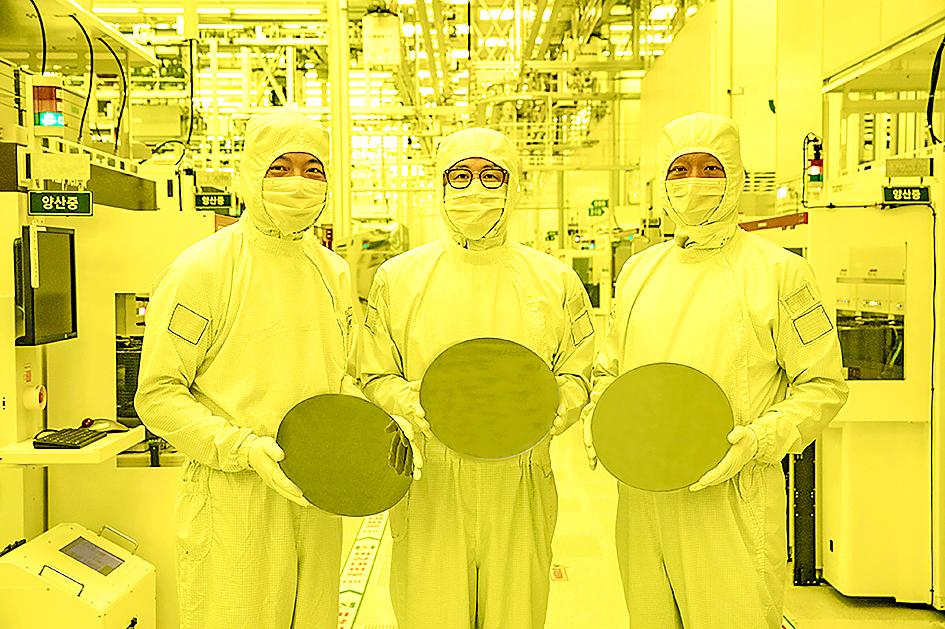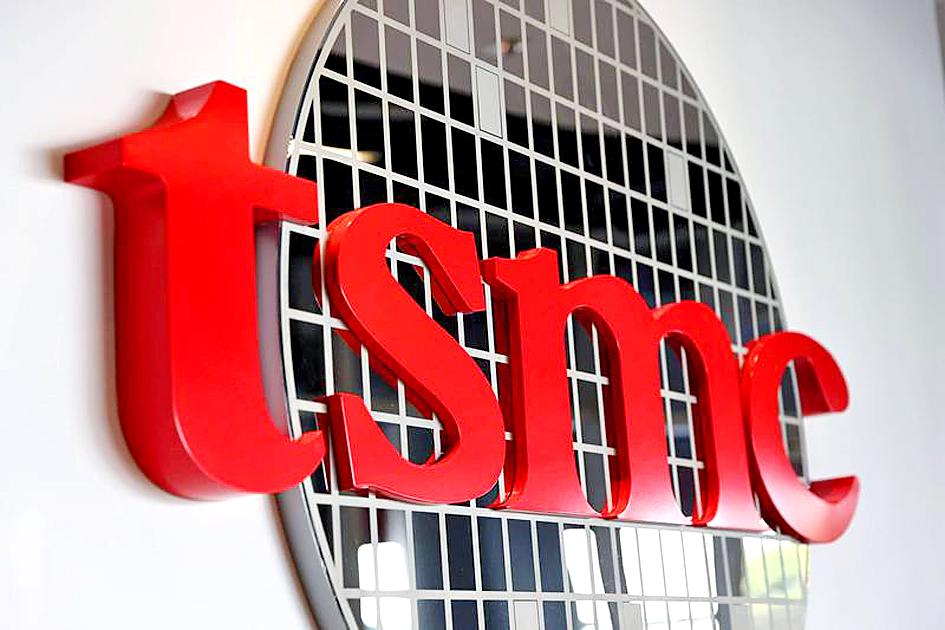Samsung Electronics Co yesterday commenced mass production of 3-nanometer chips that are more powerful and efficient than predecessors, beating rival Taiwan Semiconductor Manufacturing Co (TSMC, 台積電) to a key milestone in the race to build the most advanced chips in the world.
South Korea’s largest company said in a statement that it was beginning with 3-nanometer semiconductors for high-performance and specialized low-power computing applications before expanding to mobile processors.
By applying so-called Gate-All-Around transistor architecture, Samsung’s 3-nanometer products reduce power consumption by up to 45 percent and improve performance by 23 percent compared with 5-nanometer chips, it said.

Photo: AFP
Samsung’s push to be first to market with the latest technology is essential in its uphill climb to match TSMC, which remains dominant in the contract chipmaking market.
The Taiwanese firm accounts for more than half of the global foundry business by revenue and is the exclusive supplier of Apple Inc’s silicon processors for iPhones, iPads, MacBooks and desktop Mac PCs.
TSMC has said its 3-nanometer technology would be the most advanced technology when it is introduced in the second half of this year.

Photo: Reuters
The technology would first be used to manufacture chips for high-performance-computing applications and smartphones, it said.
TSMC also said it has seen stronger customer engagement for its 3-nanometer technology for the first year, compared with the previous-generation 5-nanometer technology.
TSMC adopts a different approach in developing its 3-nanometer technology. The company said it adopts the FinFet transistor structure to deliver the best technology maturity, performance and cost for its customers.
TSMC and Samsung are competing for large multiyear orders from the likes of Apple and Qualcomm Inc.
Samsung is producing the 3-nanometer chips at its Hwaseong facilities and is expected to extend that production to its newest Pyeongtaek fab.
“We will continue active innovation in competitive technology development and build processes that help expedite achieving maturity of technology,” said Siyoung Choi, president and head of Samsung’s foundry business.
Samsung’s launch of 3-nanometer chip production should not affect TSMC’s market share and sales growth in the next 12 months, Bloomberg Intelligence analyst Charles Shum (沈明) said.
Samsung’s 3-nanometer chip needs to demonstrate that it can be produced at the same cost-efficiency level as TSMC’s most advanced N3 process before it can gain new orders from Apple, Qualcomm and other large chip designers, Shum added.
Samsung’s advance comes at a sensitive time for the semiconductor industry, whose place in the global geopolitical order is currently under scrutiny by leading governments.
The US and China have both taken steps to bring more chipmaking capacity and expertise within their borders — arguing it is a matter of national security — and Samsung is in the process of setting up a new fabrication facility in Texas.
Additional reporting by Lisa Wang

MAKING WAVES: China’s maritime militia could become a nontraditional threat in war, clogging up shipping lanes to prevent US or Japanese intervention, a report said About 1,900 Chinese ships flying flags of convenience and fishing vessels that participated in China’s military exercises around Taiwan last month and in January last year have been listed for monitoring, Coast Guard Administration (CGA) Deputy Director-General Hsieh Ching-chin (謝慶欽) said yesterday. Following amendments to the Commercial Port Act (商港法) and the Law of Ships (船舶法) last month, the CGA can designate possible berthing areas or deny ports of call for vessels suspected of loitering around areas where undersea cables can be accessed, Oceans Affairs Council Minister Kuan Bi-ling (管碧玲) said. The list of suspected ships, originally 300, had risen to about

DAREDEVIL: Honnold said it had always been a dream of his to climb Taipei 101, while a Netflix producer said the skyscraper was ‘a real icon of this country’ US climber Alex Honnold yesterday took on Taiwan’s tallest building, becoming the first person to scale Taipei 101 without a rope, harness or safety net. Hundreds of spectators gathered at the base of the 101-story skyscraper to watch Honnold, 40, embark on his daredevil feat, which was also broadcast live on Netflix. Dressed in a red T-shirt and yellow custom-made climbing shoes, Honnold swiftly moved up the southeast face of the glass and steel building. At one point, he stepped onto a platform midway up to wave down at fans and onlookers who were taking photos. People watching from inside

Japan’s strategic alliance with the US would collapse if Tokyo were to turn away from a conflict in Taiwan, Japanese Prime Minister Sanae Takaichi said yesterday, but distanced herself from previous comments that suggested a possible military response in such an event. Takaichi expressed her latest views on a nationally broadcast TV program late on Monday, where an opposition party leader criticized her for igniting tensions with China with the earlier remarks. Ties between Japan and China have sunk to the worst level in years after Takaichi said in November that a hypothetical Chinese attack on Taiwan could bring about a Japanese

STREAMLINED: The dedicated funding would allow the US to transfer equipment to Taiwan when needed and order upgraded replacements for stockpiles, a source said The US House of Representatives on Thursday passed a defense appropriations bill totaling US$838.7 billion, of which US$1 billion is to be allocated to reinforcing security cooperation with Taiwan and US$150 million to replace defense articles provided to the nation. These are part of the Consolidated Appropriation Act, which the US House yesterday passed with 341 votes in favor and 88 against. The act must be passed by the US Senate before Friday next week to avoid another government shutdown. The US House Committee on Appropriations on Monday unveiled the act, saying that it allocates US$1 billion for the Taiwan Security Cooperation Initiative